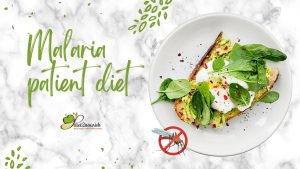Malaria is a serious illness caused by a parasite that is transmitted to humans through the bite of infected mosquitoes. Symptoms can include fever, headache, chills, and fatigue. While there is no specific diet for malaria, it is important for patients to eat a healthy and balanced diet to support their immune system and aid in recovery.
Here are some dietary tips for malaria patient diet
- Stay Hydrated
Malaria patients may experience symptoms such as vomiting and diarrhea, which can lead to dehydration. It is important to drink plenty of fluids, such as water, coconut water, and herbal teas, to stay hydrated and help prevent complications.
- Eat a Balanced Diet
A balanced diet is important for overall health and can help to support the immune system during recovery. Malaria patients should eat a diet rich in fruits, vegetables, whole grains, and lean protein sources such as fish and poultry. It is important to limit processed foods, sugary drinks, and foods high in saturated and trans fats.
- Eat Small, Frequent Meals
Malaria patients may experience a loss of appetite or have difficulty eating large meals. Eating small, frequent meals throughout the day can help to maintain energy levels and ensure adequate nutrient intake.
- Include Foods Rich in Iron
Malaria can lead to anemia, a condition in which there are not enough red blood cells to carry oxygen to the body’s tissues. Eating foods rich in iron, such as dark leafy greens, lean meats, and legumes, can help to support the production of red blood cells and improve energy levels.
- Supplement with Zinc
Zinc is an essential mineral that supports the immune system and can help to reduce the duration and severity of malaria symptoms. Eating foods rich in zinc, such as oysters, beef, and pumpkin seeds, or taking a zinc supplement may be beneficial for malaria patients.
- Avoid Alcohol and Caffeine
Alcohol and caffeine can dehydrate the body and interfere with recovery. It is important to avoid or limit alcohol and caffeine intake during and after treatment for malaria.
- Work with a Healthcare Professional
Malaria can have serious complications, and it is important to work with a healthcare professional to develop an individualized treatment plan. In some cases, nutritional supplements may be necessary to support recovery.
In summary, while there is no specific diet for malaria, it is important for patients to eat a healthy and balanced diet to support the immune system and aid in recovery. Staying hydrated, eating small, frequent meals, including foods rich in iron and zinc, and avoiding alcohol and caffeine can all be helpful. It is also important to work with a healthcare professional to develop an individualized treatment plan.
